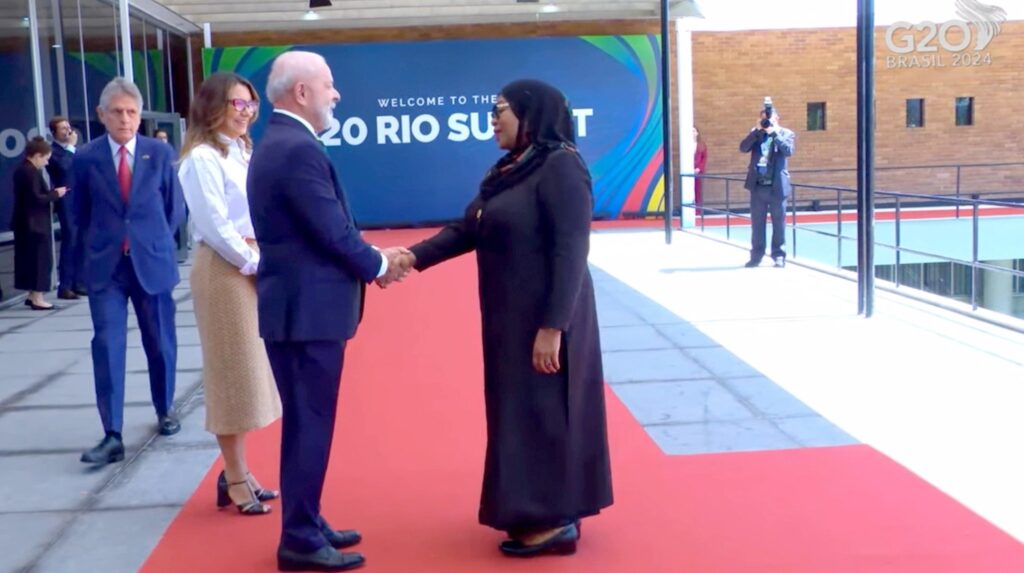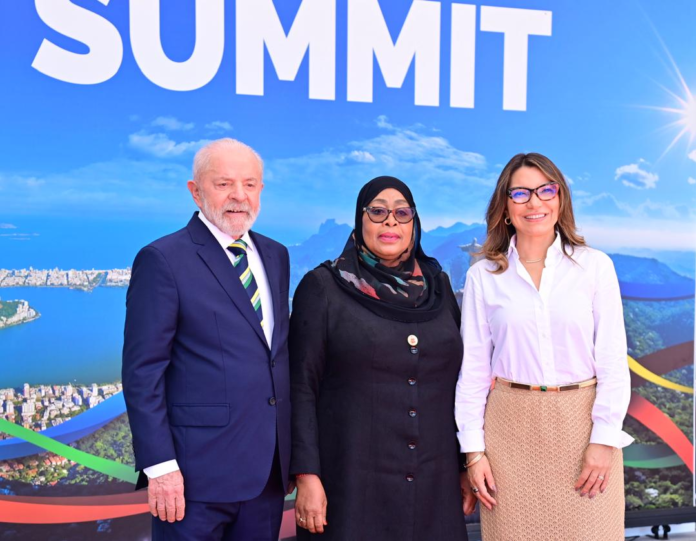By Absalom Kibanda, Rio de Janeiro-Brazil
President Samia Suluhu Hassan has rekindled the enduring vision of Tanzania’s founding father, Mwalimu Julius Nyerere, by challenging the world’s richest nations to rethink their approach to global poverty and inequality during her address at the G20 summit in Rio de Janeiro, Brazil.
Speaking to an audience of the most powerful leaders and economies, President Samia echoed Nyerere’s steadfast advocacy for debt relief, fair financial policies, and global equity. She called on G20 nations to ease the crushing debt burden on developing countries like Tanzania and reconsider the structural imbalances in trade and development assistance.

In the late 1980s, Nyerere led the South Commission, a global initiative that championed the needs of the developing world. His landmark report, which culminated in a UN General Assembly resolution in 1991, remains a blueprint for addressing the disparities between rich and poor nations. President Samia’s remarks harkened back to those efforts, positioning Tanzania once again as a moral leader on the world stage.
She highlighted the paradox of Africa as a continent abundant in resources yet disproportionately afflicted by poverty, hunger, and underdevelopment.
“However, with this world left as it is, the question we will ask in 2030 won’t be ‘how far did we fall short of reaching the SDGs’, but rather ‘how many more people has the world left behind” she reiterated.
A Renewed Focus on Nyerere’s Vision
The challenges President Samia highlighted—crippling debt, lack of access to fair trade, and technological inequities—mirror the issues Nyerere fought against decades ago. In her appeal, she urged the G20 to allocate more Special Drawing Rights (SDRs) to African financial institutions like the African Development Bank (AfDB) and to ensure a more equitable representation of developing nations in global decision-making forums.
According to her, global justice, equality, and sustainability can only be achieved when countries like Tanzania are supported with resources, representation, and partnerships that reflect the realities of the modern world.
The Weight of Inequitable Policies
President Samia’s critique comes amid a troubling rise in protectionist trade policies by G20 nations. Recent data reveals that between October 2023 and October 2024, G20 countries imposed 91 new trade restrictions, an increase of 85.7% from the previous year. These measures have impacted $829 billion in trade value, disproportionately affecting developing economies.
Emphasizing the need for a collaborative global approach to address shared challenges, she noted that such policies worsen scarcity, increase volatility, and heighten uncertainty, especially in food security and access to critical technologies.
Advancing Agriculture and Development
Despite Tanzania’s own struggles, President Samia highlighted her administration’s efforts to modernize agriculture, a sector employing 61.5% of the country’s workforce. She noted that Tanzania’s agricultural growth rate has reached 4.2%, achieving 128% food self-sufficiency and reducing poverty rates to 26.4% in 2023. However, challenges persist, including limited access to modern farming tools, fertilizers, and research driven innovation.
A Historic Presence at the G20
President Samia’s participation in the summit marked a historic first for Tanzania, with her being the only female African head of state at the gathering. Accompanied by senior officials, including Zanzibar’s Minister of State (Finance) Dr. Saada Mkuya, and Tanzania’s Minister of State in President’s Office (Planning and Investment), Professor Kitila Mkumbo, Samia held multiple key side meetings to strengthen Tanzania’s international partnerships.

The G20 summit, hosted by Brazilian President Luiz Inácio Lula da Silva, also focused on global food security, climate change, and sustainable development. Lula unveiled an international initiative to eradicate hunger and poverty, garnering the support of 81 nations, including Tanzania. Echoing his sentiments, President Samia emphasized the urgency of global action.
President Samia’s presence at the G20 summit reaffirmed her role as a torchbearer, elevating Tanzania as a voice of conscience in an increasingly divided world that now, more than ever, requires stronger multilateral cooperation.


